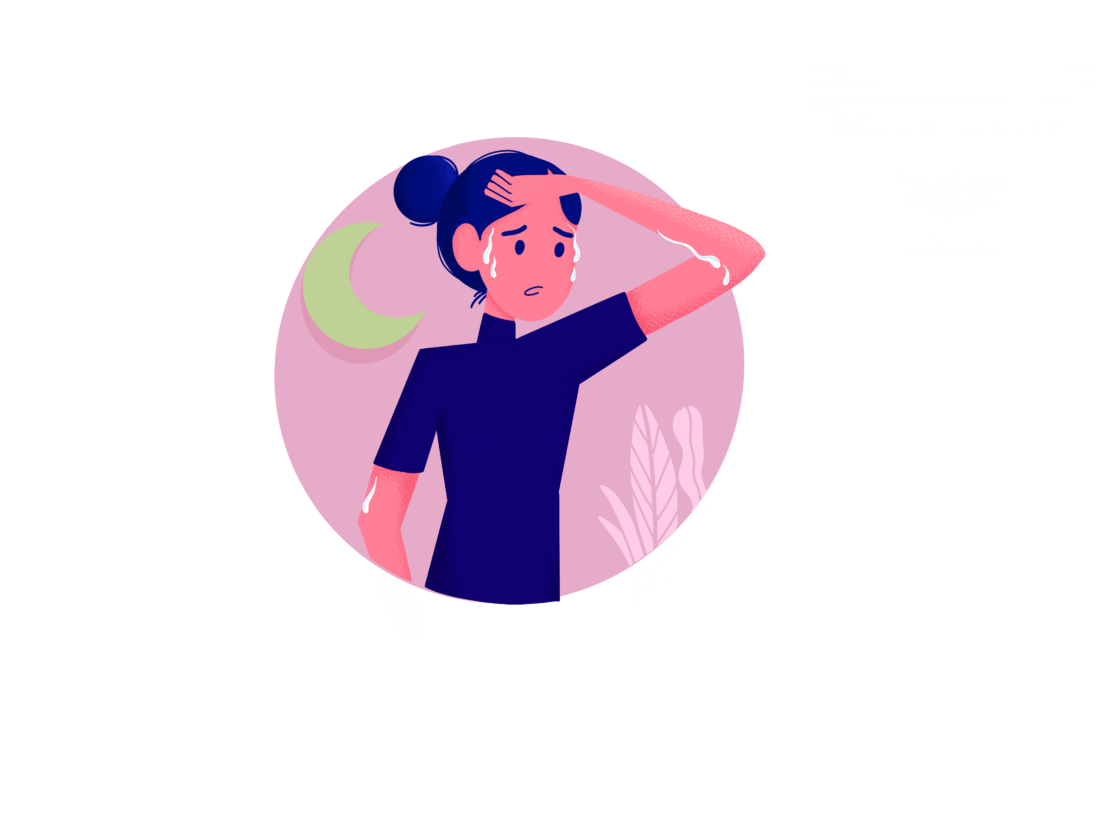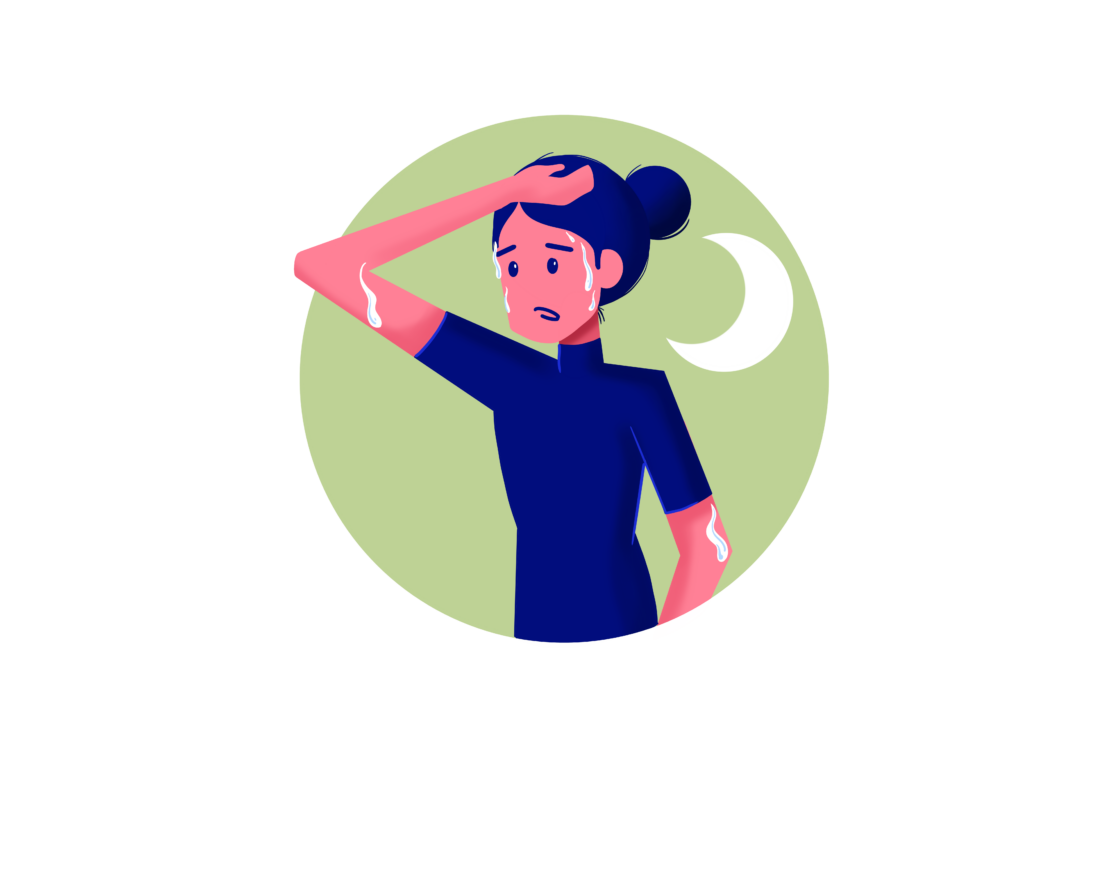Menopause is full of wonderful surprises isn’t it? Just when you thought you’d gotten used to the hot flashes during the day, along come the night sweats. Waking up drenched in sweat, your heart racing and feeling like your skin has been baking in the sun for hours.
Night sweats are very common in menopause, and luckily there are some simple things you can do at home to reduce the likelihood of you having them
What Are Menopausal Night Sweats?
Night sweats are perhaps one of the most well-known symptoms of the menopause, along with hot flashes. They’re an uncomfortable and sometimes inconvenient symptom, where you suddenly feel very hot during the night and sweat uncontrollably.
At times night sweats won’t wake you up at the time they’re happening – instead, you’ll wake up in the morning drenched in sweat, likely with damp bedding surrounding you. Sometimes you might wake up in a cold sweat, wondering why on earth your body feels like it’s on fire.
It can be frustrating, especially because it means extra washing during a challenging period of your life! But the good news is there are things you can do to reduce night sweats, or even prevent them altogether.
If you’re experiencing these kinds of symptoms, why not book a consultation to chat with our menopause clinic?

What Causes Night Sweats?

Night sweats are a type of vasomotor symptom, which is what happens when the blood vessels dilate in an attempt to regulate your temperature. By dilating the blood vessels, more blood is sent to the surface of the skin, where the heat can be lost to the air, delivering cooler blood back to your body. This process leaves you feeling intensely hot on every part of your body, and may cause your skin to or sweat profusely to try and cool your core temperature.
Every woman experiences them differently, with some having night sweats every night, and others only having them every now and then.
Only 20% of women experience no night sweats during menopause, and experts aren’t entirely sure exactly why that is. Research has shown however that night sweats are more common in people who smoke or are overweight.
Night sweats and hot flashes can start before or during the menopause process, and can last for the entire length of your menopause. Like most menopausal symptoms, they are triggered by the ever-changing hormone levels in your body.
In my 10 years of experience looking after menopausal patients, night sweats has been one of the most frequently complaint about symptoms. Due to the fact that it can disturb sleep, it results in reduced function the following day as well as fatigue.
Specifically, the hormones oestrogen and progesterone, which are responsible for the body’s temperature control. This is the same reason many pregnant women have trouble controlling their body temperature, because both hormones are in flux at this stage too.
There is also evidence to suggest that the declining oestrogen levels in the brain can cause dysregulation in the brain’s hypothalamus, which is responsible for controlling your temperature. Differing hormone levels cause a glitch in your internal thermostat, which makes it difficult for it to understand and regulate temperature.
So the changes in hormone levels make your body more sensitive than ever to temperature during menopause, and even the smallest change can set off a hot flash or trigger night sweats.
4 Things You Can Do To Stop Night Sweats
If you’re finding yourself exhausted and frustrated with night sweats during menopause, there are a few things you can do to reduce them, or alleviate the worst of the symptoms:
Exercise:
Small amounts of exercise every day can help your body understand and regulate its own temperature more effectively, as well as keep you healthy for the transition. Research has shown that cycling or jogging for 45 minutes a day a few times a week can significantly reduce the number of hot flashes and night sweats you experience.
Avoid certain food:
You don’t have to completely change your diet, but if you’re struggling with night sweats then avoiding certain foods can help, especially close to bedtime. Any foods that are spicy, highly acidic or spicy should be avoided in the evenings altogether, as should chocolate and citrus.
These foods are either high in protein (which can trigger night sweats similar to the ‘meat sweats’, where your body has to work harder to digest large amounts of protein), or high in acids that can cause acid reflux, which in turn can trigger night sweats.
Cut out alcohol:
Alcohol has a huge impact on every part of your body, including your circulatory system. If you’ve ever experienced the ‘beer blanket’ effect, you know that it can change your body’s perception of temperature.
Alcohol is a vasodilator, which means that when you drink it you are pre-widening your blood vessels and making it primed for night sweats. Cutting out alcohol is a good way to reduce the number of night sweats you experience.
HRT:
Hormone Replacement Therapy (HRT) is a common treatment for menopause symptoms, and it has been proven to reduce or even eliminate night sweats in many women.
Hot Flashes Vs Night Sweats
Night sweats are often confused with hot flashes, which is understandable since they are so similar. A hot flash is when you feel a sudden overwhelming heat in your body, often accompanied by looking flushed, at random times during the day. These flashes won’t last long and tend to go away on their own.
Night sweats only occur during your sleep, and cause you to sweat profusely, sometimes leading you to wake up in a cold sweat. While night sweats and hot flashes are both caused by vasodilation, new research has found that night sweats cause a higher level of stress than hot flashes, last much longer (7–10 years in some cases), and produce much more sweat.
What Does It Feel Like Having Night Sweats?
Every woman experiences night sweats a little differently, but the most common description is of a sudden and intense heat in your body. Your skin may flush very quickly, and you will start to sweat. Not in a minor way, but as though you were sitting in a sauna, with sweat running off your body.
Your heartbeat might also speed up as your body struggles to cool itself, and you may even feel dizzy. The onset of night sweats can often feel similar to a panic attack, which can cause you to wake up suddenly. Night sweats can last a few moments or they can last longer, and you may feel a little cold once it has passed.
But night sweats are more than just inconvenient. They tend to lead to disturbed night’s sleep, which over the course of days and weeks can lead to chronic sleep deprivation and all of the symptoms that come with it.
Night sweats are also uncomfortable, can lead to skin issues, and have been found to cause high levels of stress in women who struggle with them.
Of course, there are other things that can cause night sweats, and if you feel that your symptoms are extreme, you should ask your doctor for a check-up. A few other conditions that can cause night sweats include:
- Hyperhidrosis
- Sleep apnea
- Endocrine disorder
- Prolonged sleep disturbances
- infections
- Certain medications
How Long Do Night Sweats Last?

While night sweats can be different for every woman, most night sweat incidents last anywhere between a few moments and 15 minutes, and you may experience multiple episodes during the course of the night.
If you’re taking steps to try and reduce your night sweats, you may find that the episodes are less frequent or don’t last as long, with women on HRT seeing their night sweats stop completely within a few weeks of treatment. Night sweats are not more common at any one point of menopause, but some studies done by Dr Stephanie Faubian MD MBA have shown that they can carry on for years after other menopause symptoms have subsided.
When Should I Be Concerned About Night Sweats?
Night sweats are a normal, but irritating, part of menopause. But if you feel that night sweats are having a negative impact on your life, then you should consult your doctor. A GP may be able to prescribe you medication to manage the night sweats.
Alternatively you can reach out to the team here at OMC to talk to one of our female doctors and specialist nurses about your symptoms, and we’ll guide you through our HRT treatments and other options to help deal with the night sweats you’re experiencing.
Simply click here to book a consultation and we’ll be in touch shortly.

